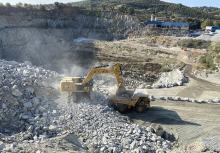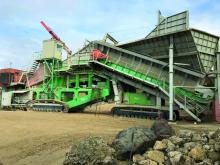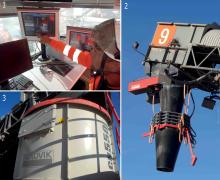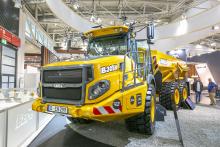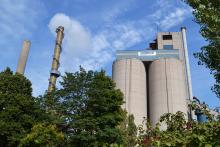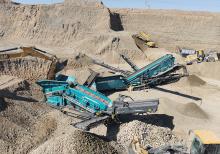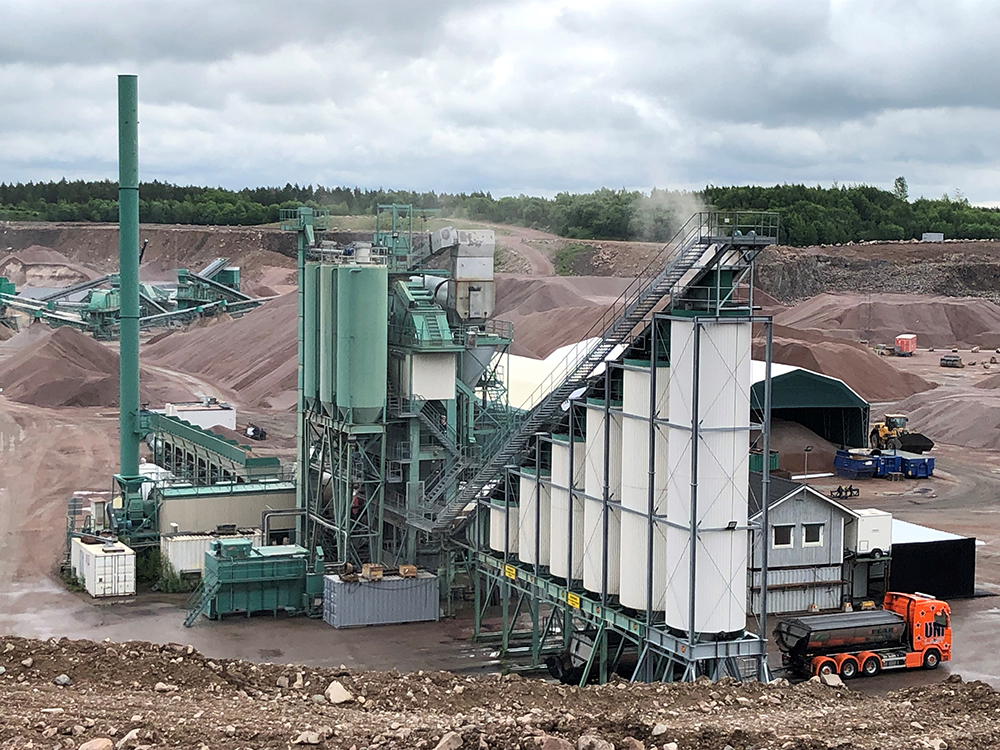
Swerock’s Vändle quarrying site near the city of Västerås in central Sweden opened in 1992 and is the fifth-largest quarry in the country.
The quarry processes around one million tonnes of gravel, crushed stone and asphalt material a year and has a working area of 52 hectares, of which 48 hectares has so far been quarried. It has at least another 30 years of working life as long as suitable quarrying permits can be achieved. Another 300,000 tonnes of material are recycled annually, meaning the site handles a total of 1.3 million tonnes per year.
Swerock is one of Sweden’s largest suppliers of materials and services to the construction industry and the company is part of the Peab Group.
Vändle quarry manager Patrick Ericzén also manages three other Swerock quarry sites in the area, and visits each one every working day as well as spending time at the company’s office in Västerås.
The Vändle quarry’s products are predominantly used around the Västerås area for road and infrastructure construction projects, with the remainder providing ballast for use on railway track in Sweden.
“Material is moved from this site by truck in a 50km radius only, and for material that is transported by rail for use as rail ballast it is up to a 150km radius,” says Ericzén. “If it’s any further than this there are other quarry sites closer-by and we can’t compete as it’s too expensive. It’s all about logistics.”
There are currently a lot of major construction projects taking place in the Västerås area that are helping drive demand for the quarry’s products. “Västerås has large logistical hubs such as ICA, one of the largest food transporters in Sweden,” says Ericzén. “They are building their main storage centre for distribution here and need a lot of material.”
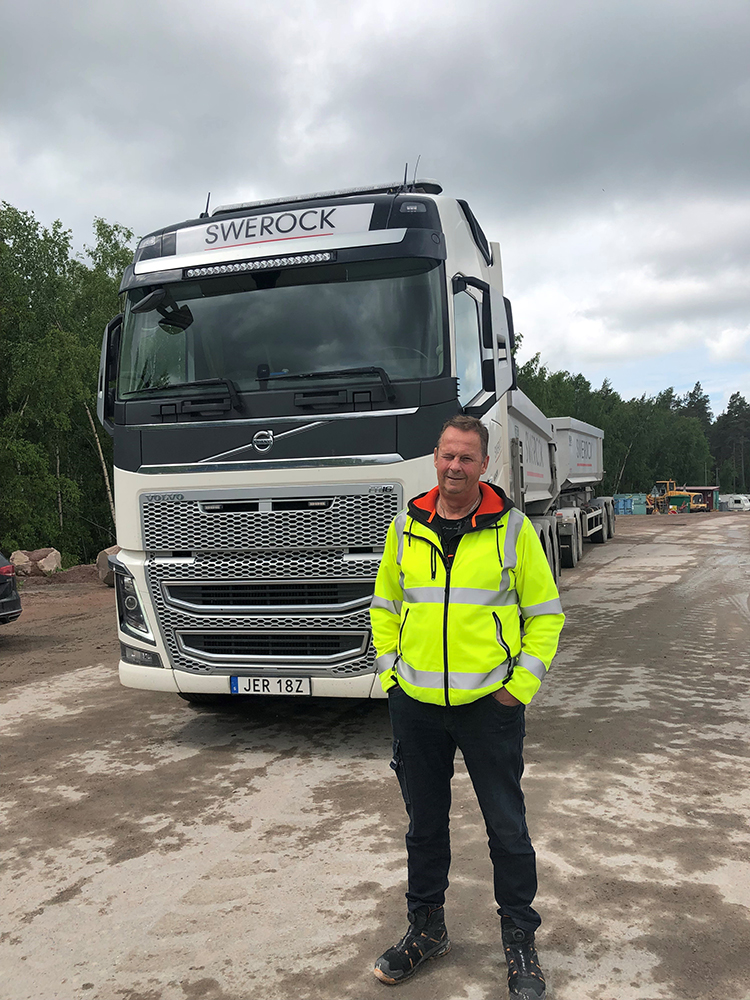
Demand for the quarry’s products is also being driven by the current boom in infrastructure and housing projects being carried out across Sweden. “The country has gone from a population of 8.5 million to 10.5 million within the last decade and there is a lot of need for new housing,” Ericzén says.
The quarry boasts the impressive safety record of not having had a significant incident for more than a decade. At the centre of the site’s health and safety measures is a smartphone-based reporting system to log all types of incidents and occurrences.
“We do a lot of preventive work,” says Ericzén. “It’s about the mindset of the operator – if there is some piece of equipment that is broken or defective you take it away and report it, and it is fixed.”
Per Leis, business manager hub north EMEA for Volvo CE which has close business links with the quarry, says that this effective safety culture is driven by the open and less hierarchical Swedish way of working: “They are all familiar and they are friends. There is a boss and he is still the boss, but they have an open relationship and are not afraid of saying if something is wrong. It’s another way of working in Sweden. Some people say it’s softer, but we say it’s working better.”
Ericzén agrees: “I don’t call myself boss, I’m a working partner, part of the team. If anyone thinks I am doing something wrong I want them to tell me.”
Cameras are extensively used at the site, on the crushing and screening plant as well as being fitted to all vehicles. There are also cameras fitted to the incoming and outgoing sections of the weighing bridge, which is controlled remotely from Swerock’s Västerås office
Thirty-five people work at the Vändle site with only three being employed by Swerock, which Ericzén says is a common set-up in Sweden. Quarries in the Västerås region are generally operated by major players such as Swerock owner Peab, NCC and Skanska with large numbers of sub-contractors working on the sites.
The site foreman and one of the truck drivers at Vändle are Swerock employees, while the other 32 workers also report directly to Ericzén.
He says it is planned in two to three years’ time to go another 22m deeper down into the rock, and to extend over another 29 hectares in area. The lowest point of the quarry that has been drilled down to is currently 15m above sea level.
The quarry operates 20 machines, mostly Volvo CE equipment, as well as some from Caterpillar. The machines include two Volvo L220H and one Volvo L180 wheeled loaders, each weighing between 25 and 30 tonnes, to load material onto trucks. “The loaders travel a total of around 100km each per day,” says Ericzén. “There is a lot of area to cover and we are looking all the time to get an increase in the size of machines.”
Four Volvo CE excavators work on the site : an EC380 used on recycling activity, an EC360 on overburden, an EC380 used with road trucks, and an EC300 working with the site’s crushing and screening plant to process a total of 7,000 tonnes of material each day.
The quarry has one fixed crushing and screening plant which processes 4,000 tonnes of material per day. The plant’s primary crusher is supplied from Metso Outotec, with the other stages provided by Swedish company Svedala Industri.
There used to also be two mobile crushers onsite but this has now been reduced to one which processes 3,000 tonnes per day. The mobile plant is supplied by Jonsson & Söner, and was manufactured in the city of Härnösand.
A Sandvik drill rig works at the quarry all year round. Both the crushing & screening and drilling equipment are operated by sub-contractors. The site carries out both drilling and blasting activity, with drilling down and then loading of dynamite and blasting of the material.
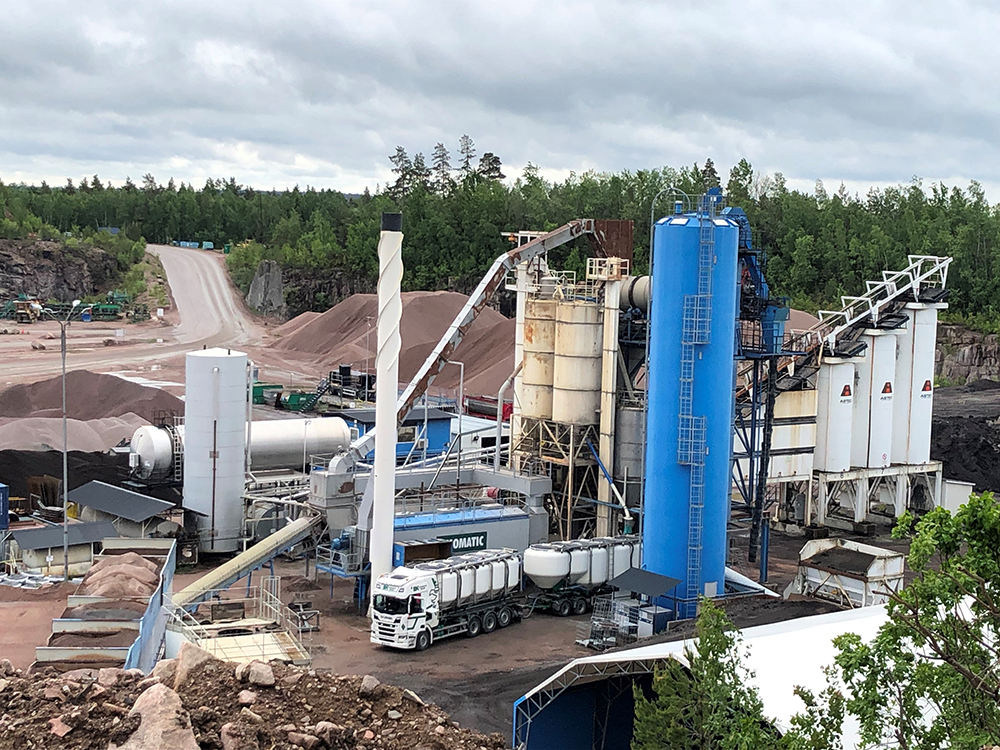
A pre-crushing “knocking” crusher is used to reduce the size of the blasted stone so that the main crushing and screening plant can process them. After the blasting process, material is loaded directly onto trucks. It is then unloaded into the primary crusher, which crushes the material down to 300mm. It then goes to the secondary crusher in different sizes, or for the railway ballast that is transported around Sweden.
The site’s mobile crusher produces the highest volume of material from the site, producing 0-16mm and 16-32mm sizes. The fixed crushing plant produces the higher-quality material that is required for use in asphalt production.
The quarry has been producing one million tonnes annually for the last five years.
Ericzén says the future production levels of the site are linked to market demand, which Swerock envisages remaining at a high level in the coming years. Swerock is applying for extensions to its current one million tonnes per year production, but these need to be approved by environmental and regional authorities, and such permissions can be hard to obtain in Sweden.
In addition, there are four haulers used to transport overburden. These include two articulated haulers - a Volvo A25 and a Caterpillar 725; and two 60-tonne Caterpillar rigid haulers.
“The latest machines bought for the quarry are a Volvo CE EC180C crawler excavator and a Volvo CE EC220E crawler excavator,” says Ericzén. The machines were bought last year by Nordic construction company NCC and one of the sub-contractors at the quarry.
In terms of the benefits from the quarry’s newer equipment, he adds: “Our excavators and wheeled loaders – both Volvo and other machines - have improved a lot in recent years, particularly in terms of operator environment and ease of operation. They have also improved safety and productivity.
“Fuel consumption with the new Volvo and Cat haulers has been improved by 15-20% compared to the previous machines, which is very important with the recent increases in fuel prices.”
He estimates that the new machines usually take around five to seven years to provide a return on investment. The wheeled loaders usually have a working lifespan of around 10,000 to 15,000 hours and work on average 2,000 hours a year (with a similar figure for the excavators). A lot of material transporting by loaders takes place around the quarry’s large area.
At the end of their working lifespan the machines are then used as back-up at the quarry, replacing the existing back-up machines which are sold off.
The quarry purchases its Volvo CE machines from Swecon, which is the Volvo CE distributor for the Västerås area and is responsible for the servicing contract. “We are very impressed with their service,” says Ericzén. “There might be some disturbances with parts but they always fix it in due time.”
Under the servicing agreement Swecon performs the oil changes on the quarry’s Volvo CE vehicles, all the 500-hour equipment checks, and the larger service inspections at 1,000 hours.
The quarry does not have a fleet management system providing a complete overview of the equipment, due to the high number of sub-suppliers and contractors working at the site who take care of their equipment in different ways.
Ericzén says: “For the crusher process that is a sub-supplier and there are four guys working on it. They work in rotation and see the workplace with new eyes every time, and if there is something that needs to be fixed, they do it in the evening.”
For the material weighing bridge process there is a card-based system for vehicle drivers to check in and out.
“A fleet management system is site-dependent,” Ericzén explains. “If you have a large quarry with 25 articulated haulers moving around, then it’s effective. We are working with the quality of crushed stone and the tonnage – that is the most important part for us – and we have full control of this without a fleet management system.”
Given its proximity to Volvo CE’s Eskilstuna research & development site, the Vändle quarry’s input has been used in developing Volvo’s excavator buckets and attachments.
Leis, who is shortly to retire after over 25 years at Volvo CE, says: “There is a close cooperation between Volvo CE and the quarry and we do a lot of testing here.”
The quarry is open all year round from 6am to 4pm Monday to Friday, while the onsite crushers operate four longer days a week from Monday to Thursday. “The crusher operators come from further north in Sweden and do four 12-hour shifts from 6am to 6pm,” Ericzén says. “It’s a kind of tradition in Sweden that crusher operators are from the north of the country.”
There are also two asphalt plants operating on the site, which Ericzén says is very rare. One is operated by NCC and the other by Swerock’s parent company Peab, and each produces around 120,000 tonnes of asphalt per year.
The quarry produces sizes of crushed stone material ranging from 0.4mm, 4-8mm, 8-11mm, 11-16mm, 16-22mm, and 22-32mm for asphalt production. The 32-64mm size is also produced for use on railways. The 32-64mm railway material is washed at an onsite washing plant supplied by Sandvik.
“A lot of concrete and asphalt is recycled on this site,” says Ericzén. “The profitability of recycled material has increased by SEK300 [€28.62] per tonne due to high bitumen prices, partly caused by the war in Ukraine which is a big bitumen producer.”
Sweden is also building a lot of wind turbines in the north of the country to provide clean power, and these require a large amount of concrete.
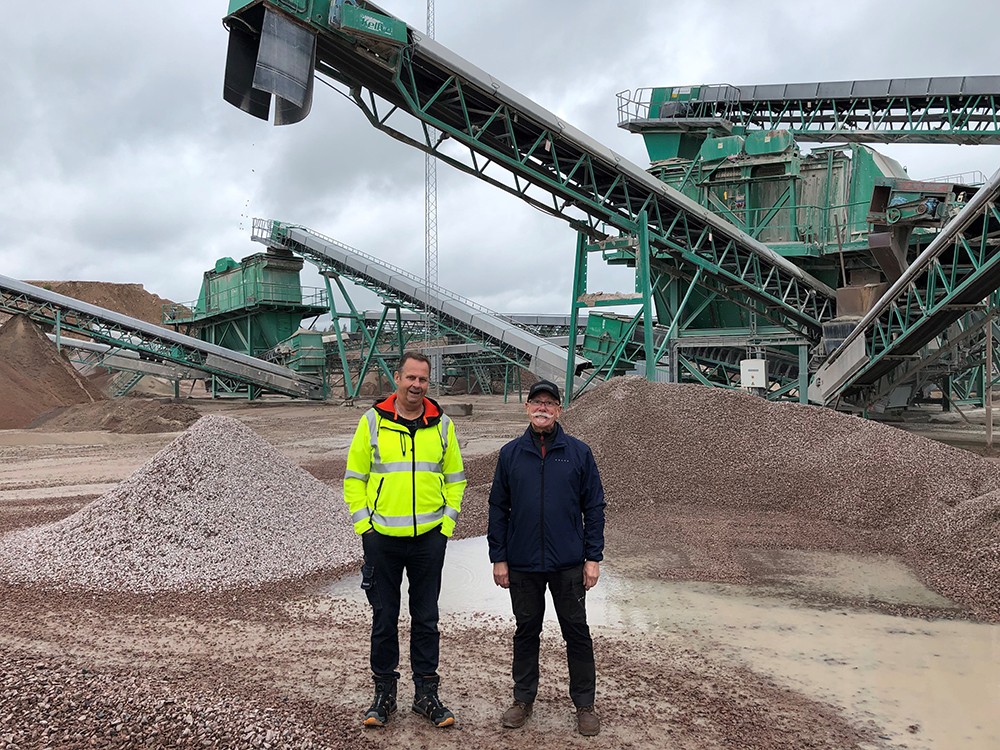
Peab puts a strong emphasis on reducing its carbon footprint and the Vändle quarry (and all other Swerock sites) only uses machines complying with the latest emissions standards, and aims to electrify as much as it is possible to do. Electrification of quarrying vehicles is still at an early stage but crushing machines and other parts of the production process are electrified as much as possible.
Sweden has been at the forefront of pioneering autonomous and electric quarrying machine technology with initiatives such as the ‘electric quarry’ pilot operated by Volvo CE and Skanska at the latter’s Vikan Kross quarry near Gothenburg. Ericzén says: “I don’t see it happening here [at the Vändle quarry] for the time being as our operations are too flexible. You probably have to build a site from the beginning and adapt it to these machines.
“We would be interested in deploying electric vehicles but at the moment there is nothing available suitable for quarries such as ours. The loaders do 100km a day so it would need one hell of a battery.”
He adds that, for an excavator, the quarry operator would normally want a 40-tonne machine to provide steady production. Currently the largest electric excavator being piloted is Volvo CE’s 23-tonne model.
As part of its sustainability efforts, the quarry is operating a project where it measures the CO2 output per crushed tonne. “A lot of this kind of activity is due to legislation from the Swedish state,” says Leis. “When a project is started, the carbon footprint has to be declared because the environmental impact is part of the tender. If you don’t have the latest compliant machines, you will not be part of the tender. This is putting pressure on the suppliers as well, including us.”
Despite this range of challenges facing the quarrying sector, Ericzén is positive about the future of the industry in both Sweden and across Europe: “We must have quarrying for infrastructure,” he says. “It’s totally impossible to build if you don’t have the stones.”

